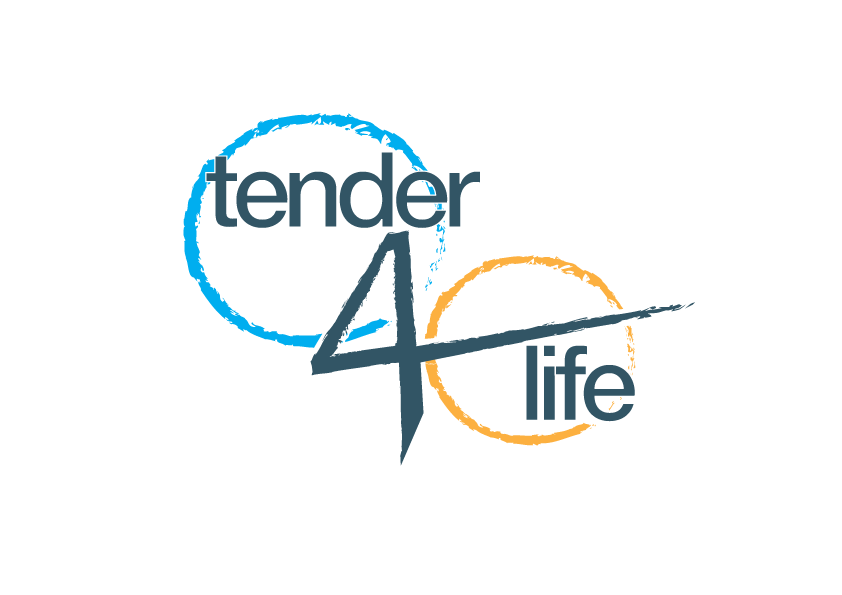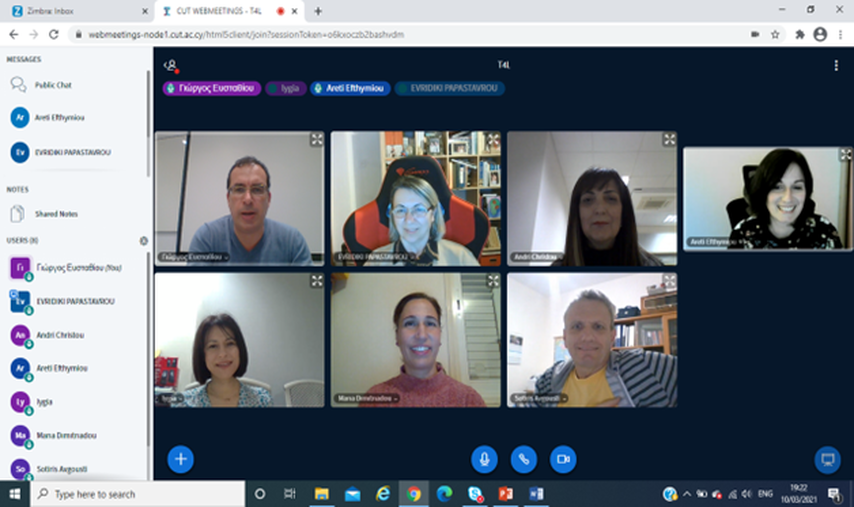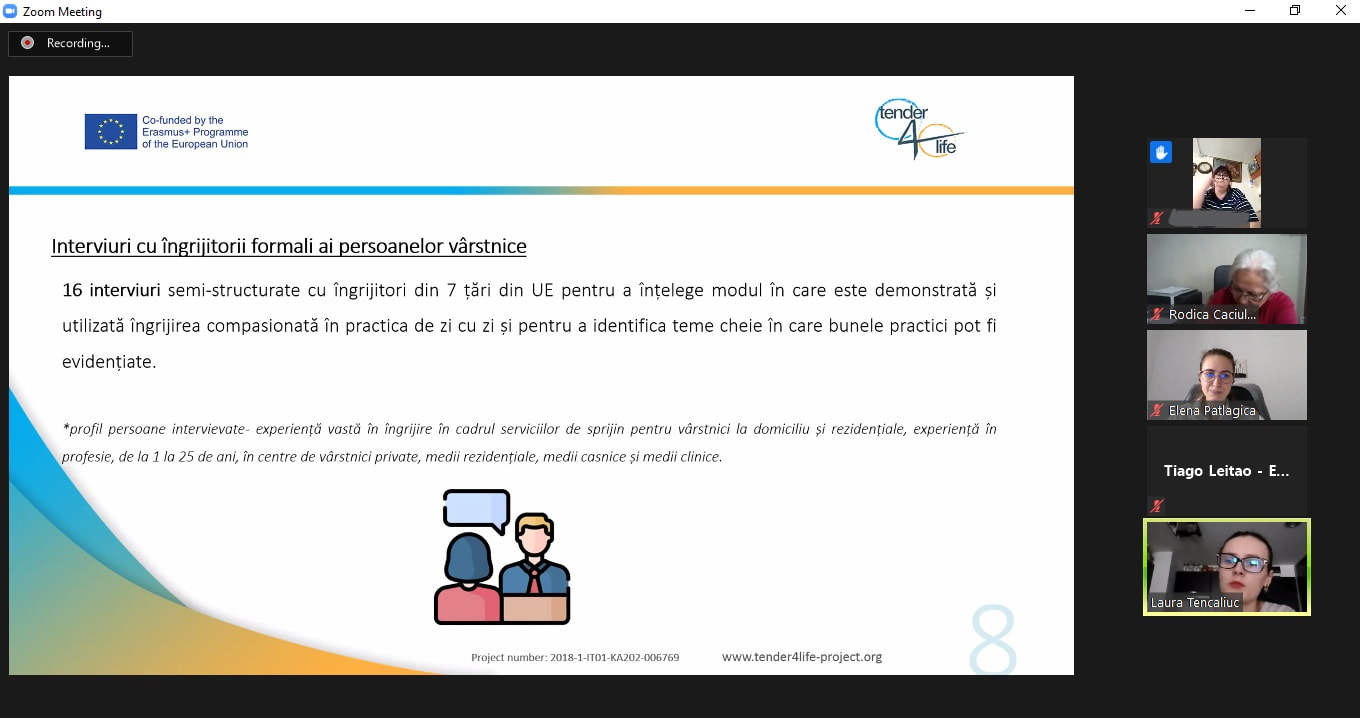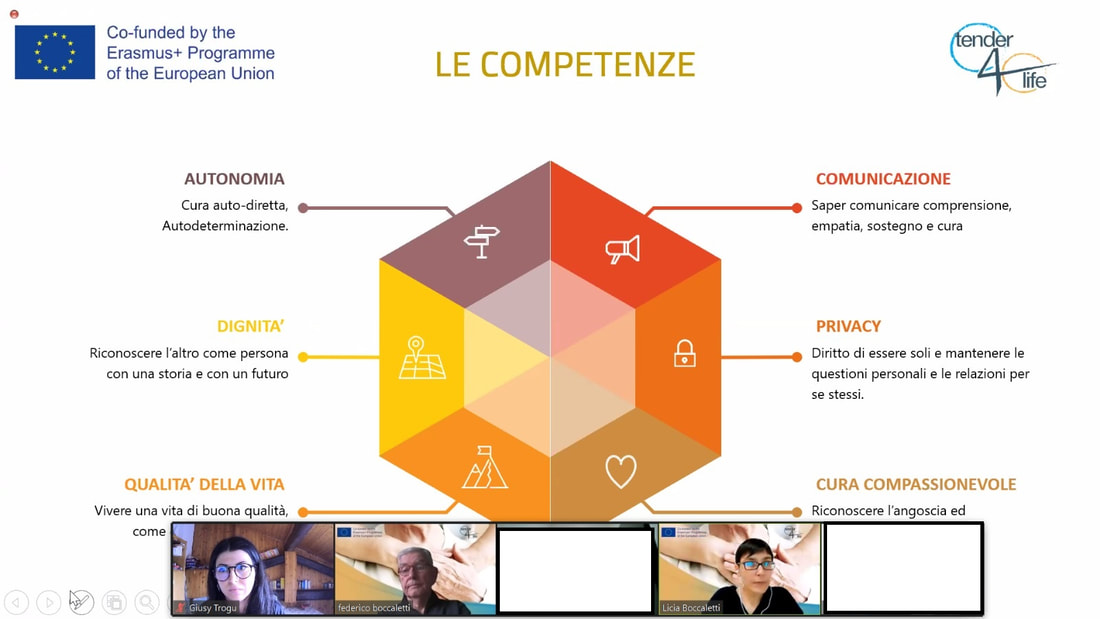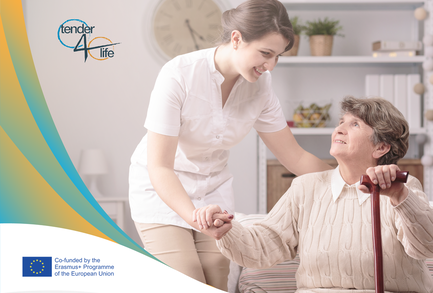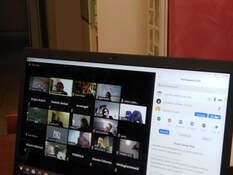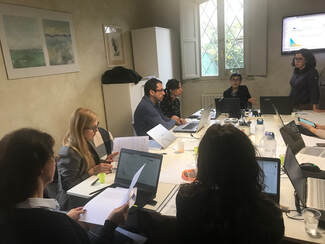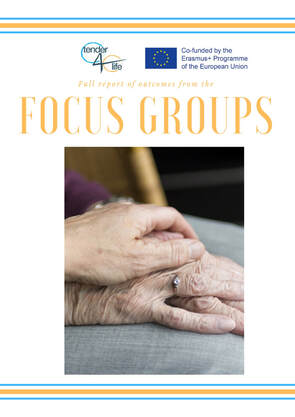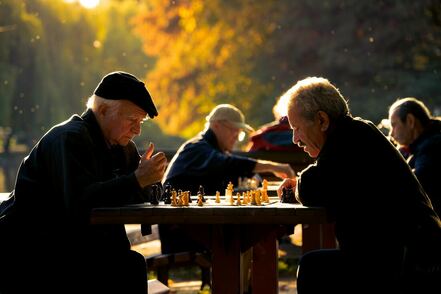|
TENDER4LIFE project aims to promote the professional development of low skilled adults working in elderly care settings, by providing them with a complementary and alternative curriculum, based on a humanistic approach.
Tenderness for Life project will enable care providers to implement a set of tools to enhance professional qualification of low-level elderly care workers, as well as to increase their competences that can directly influence their self-esteem, leading to higher levels of motivation. Adequate qualification and training leads to better preparation of elderly care workers to deal with contemporary situations. |
/ Gallery
|
|
|
News
The online workshop of the Erasmus + Tenderness for Life program has been completed in Cyprus
Upon completion of the European Tenderness for Life program, which lasted 3 years, the Department of Nursing of the Cyprus University of Technology successfully organized the online workshop entitled ‘Developing the humanitarian skills of elderly caregivers’ on Wednesday, 10th March 2021, 15: 00 -19:00.
The workshop was attended by a total of 32 professionals: carers, nurses and representatives from academia and research from both Cyprus and Greece. It is noted that similar workshops are held during March 2021 in all countries that participate in the program (Cyprus, Romania, Italy, Finland, Portugal and the United Kingdom).
The participants were welcome by Dr Evridiki Papastavrou, the Associate Professor of the Department of Nursing of the Cyprus University of Technology, who also coordinates the program in Cyprus. Dr E. Papastavrou stressed out the importance of the training of the professional caregivers of the elderly, aiming at acquiring and developing interpersonal and personal-centered skills, ensuring more active and dignified ageing. The team of the Cyprus participation consists of Dr George Efstathiou, Dr Theology Tsitsi, Dr Areti Efthymiou, Dr Andri Christou, Dr Sotiris Augusti and Mrs Maria Dimitriadou.
Initially, there was a presentation of the ‘new profile’ of the modern elderly person as well as the ‘new professional profile’ of caregivers skills, as they emerged through interviews with both caregivers and the elderly.
The presentation was followed by a description of the pilot study of the Blended-learning program that took place between August - September 2020, attended by caregivers of the elderly. In continuation, there was reference to the process of connecting the online platform of the educational program, with emphasis on the free accessibility to all Greek translated lectures of the educational program through the YouTube channel - Tender4Life Cyprus.
In addition, there was a presentation of the ‘Good Practice Guide’ which addresses the caregivers/trainers/managers in order to help the stakeholders to understand through case studies the importance and application of ‘good’ humanitarian approaches of care to the elderly.
The workshop was completed with one of the participants-carers' contribution to the pilot training program, describing her views, feelings, and experiences while attending the training program.
The workshop was attended by a total of 32 professionals: carers, nurses and representatives from academia and research from both Cyprus and Greece. It is noted that similar workshops are held during March 2021 in all countries that participate in the program (Cyprus, Romania, Italy, Finland, Portugal and the United Kingdom).
The participants were welcome by Dr Evridiki Papastavrou, the Associate Professor of the Department of Nursing of the Cyprus University of Technology, who also coordinates the program in Cyprus. Dr E. Papastavrou stressed out the importance of the training of the professional caregivers of the elderly, aiming at acquiring and developing interpersonal and personal-centered skills, ensuring more active and dignified ageing. The team of the Cyprus participation consists of Dr George Efstathiou, Dr Theology Tsitsi, Dr Areti Efthymiou, Dr Andri Christou, Dr Sotiris Augusti and Mrs Maria Dimitriadou.
Initially, there was a presentation of the ‘new profile’ of the modern elderly person as well as the ‘new professional profile’ of caregivers skills, as they emerged through interviews with both caregivers and the elderly.
The presentation was followed by a description of the pilot study of the Blended-learning program that took place between August - September 2020, attended by caregivers of the elderly. In continuation, there was reference to the process of connecting the online platform of the educational program, with emphasis on the free accessibility to all Greek translated lectures of the educational program through the YouTube channel - Tender4Life Cyprus.
In addition, there was a presentation of the ‘Good Practice Guide’ which addresses the caregivers/trainers/managers in order to help the stakeholders to understand through case studies the importance and application of ‘good’ humanitarian approaches of care to the elderly.
The workshop was completed with one of the participants-carers' contribution to the pilot training program, describing her views, feelings, and experiences while attending the training program.
FINAL EVENT OF TENDERNESS FOR LIFE IN ROMANIA
In Romania, the main types of social services addressed to the older persons provided by both public and private social service providers (associations, foundations) are the following: temporary or permanent home care, temporary or permanent care in a home for the elderly, care in day centres, clubs for the elderly, temporary care homes, apartments, and social housing. Generally, the services provided for the old people care consists in supervision, medical care, accommodation, meals, cleaning, socialization and cultural activities, occupational therapy, security, and other administrative activities.
Fortunately, during the last years, the debates, conferences and working groups on respect for the rights of the old persons have been arising on the public scene. Recently, the Romanian Institute for Human Rights joined on February 8th the event entitled "Digital technologies and old people: a smart combination". The emphasis was placed on the human rights-based approach to improving and developing digital skills, especially among older people, as they can ensure participation in decision-making processes.
On the 17th of March 2021, the European Association for Social Innovation, with the support of Habilitas Association, organized the national webinar “Tenderness for Life - A humanistic approach in providing care services for the elderly” to present the project outcomes and to offer assistance to those who want to integrate them within their work.
Tender4Life project aims to promote the professional development of low skilled adults working in elderly care settings, by providing them with a complementary and alternative curriculum, based on a humanistic approach. During the implementation of the project (between 2018-2021), three intellectual outputs have been developed: the Elderly care worker new job profile and competences tool including key exercises to measure elderly care workers’ performance and skills assessment to measure its level of proficiency, a B-learning course for elderly care workers - a manual and related learning materials that allows to deliver a blended learning course to promote interpersonal skills related to person-centred ways of care, humanistic approach, ethics of care or relationship-based care, and, a Good practices guide drawn from previous outputs and piloting, which contains practical information on how to use the assessment tool and training programme to introduce humanistic care.
During the national webinar, the above-mentioned materials have been presented to the audience, a total of 47 participants: care workers, managers in elderly care centres, psychologists, social workers, and medical staff.
Furthermore, the speakers at the webinar have a long experience in implementation of projects and initiatives in elderly care.
Raluca Bitleanu, Milly Village Coordinator - Community Support Foundation Bacău who focussed on presenting the context of the old people care in Romania, highlighting the differences between the rural and urban care services.
Rodica Căciulă, Vice President of the Habilitas Association - Resource and Vocational Training Center, one of the key organisations in Romania that is supporting since the beginning the expansion and advancement of home care services. Ms. Rodica Căciulă presented their long-term activity on projects and programs development in the field of aging and lifelong learning.
The participants have been actively involved in a group session discussion about the daily challenges in providing “person-centred care”. More than that, they wanted to know on a practical level how to use the Tender4Life outcomes in the everyday practice, and they were willing to receive more information and integrate the tools that would simplify their work and satisfy the beneficiaries of care.
Fortunately, during the last years, the debates, conferences and working groups on respect for the rights of the old persons have been arising on the public scene. Recently, the Romanian Institute for Human Rights joined on February 8th the event entitled "Digital technologies and old people: a smart combination". The emphasis was placed on the human rights-based approach to improving and developing digital skills, especially among older people, as they can ensure participation in decision-making processes.
On the 17th of March 2021, the European Association for Social Innovation, with the support of Habilitas Association, organized the national webinar “Tenderness for Life - A humanistic approach in providing care services for the elderly” to present the project outcomes and to offer assistance to those who want to integrate them within their work.
Tender4Life project aims to promote the professional development of low skilled adults working in elderly care settings, by providing them with a complementary and alternative curriculum, based on a humanistic approach. During the implementation of the project (between 2018-2021), three intellectual outputs have been developed: the Elderly care worker new job profile and competences tool including key exercises to measure elderly care workers’ performance and skills assessment to measure its level of proficiency, a B-learning course for elderly care workers - a manual and related learning materials that allows to deliver a blended learning course to promote interpersonal skills related to person-centred ways of care, humanistic approach, ethics of care or relationship-based care, and, a Good practices guide drawn from previous outputs and piloting, which contains practical information on how to use the assessment tool and training programme to introduce humanistic care.
During the national webinar, the above-mentioned materials have been presented to the audience, a total of 47 participants: care workers, managers in elderly care centres, psychologists, social workers, and medical staff.
Furthermore, the speakers at the webinar have a long experience in implementation of projects and initiatives in elderly care.
Raluca Bitleanu, Milly Village Coordinator - Community Support Foundation Bacău who focussed on presenting the context of the old people care in Romania, highlighting the differences between the rural and urban care services.
Rodica Căciulă, Vice President of the Habilitas Association - Resource and Vocational Training Center, one of the key organisations in Romania that is supporting since the beginning the expansion and advancement of home care services. Ms. Rodica Căciulă presented their long-term activity on projects and programs development in the field of aging and lifelong learning.
The participants have been actively involved in a group session discussion about the daily challenges in providing “person-centred care”. More than that, they wanted to know on a practical level how to use the Tender4Life outcomes in the everyday practice, and they were willing to receive more information and integrate the tools that would simplify their work and satisfy the beneficiaries of care.
FINAL EVENT OF TENDERNESS FOR LIFE IN ITALY
The final event of the project took place in Italy on March the 12th 2021.
Below you can read a summary of the event and download the slides (in Italian).
Si è tenuto venerdì 12 marzo 2021 il seminario per la presentazione dei risultati del Progetto Europeo “Tenderness for life”. L’incontro web ha registrato una numerosa partecipazione e un forte coinvolgimento e interazione con i partecipanti, prevalentemente operatori sociali e sanitari.
Nel quadro di una presentazione di Roberta Fefè ricercatrice di Inapp sul “valore relazionale nella domanda di cura”, Licia Boccaletti Presidente della Cooperativa sociale “Anziani e non solo” e coordinatrice del progetto ha presentato i risultati del Progetto, frutto dell’azione congiunta di esperti di sette paesi europei, per sostenere e sviluppare le competenze umanistiche nella cura agli anziani e ai soggetti fragili.
L’importanza dello sviluppo delle competenze umanistiche è stata confortata dagli interventi di Elisabetta Barbato, Federica Taddia e Gianluca Borghi espressione di varie esperienze presentate nel mondo assistenziale in epoca Covid , fra cui la ormai famosa “stanza degli abbracci” realizzata al Centro Sartor di Castelfranco Veneto.
Si è consolidata così la convinzione che le competenze per la “umanizzazione” delle cure possano essere, oltre a una strada per rendere le persone protagoniste consapevoli del prendersi cura, un’occasione di ricomposizione di tutto il lavoro di cura: dagli operatori professionali, ai caregiver familiari, ai volontari, nel rispetto di competenze tecniche e di aree di abilità ma unita dalla volontà di operare in modo competente per mettere al centro la persona nel percorso di cura.
Below you can read a summary of the event and download the slides (in Italian).
Si è tenuto venerdì 12 marzo 2021 il seminario per la presentazione dei risultati del Progetto Europeo “Tenderness for life”. L’incontro web ha registrato una numerosa partecipazione e un forte coinvolgimento e interazione con i partecipanti, prevalentemente operatori sociali e sanitari.
Nel quadro di una presentazione di Roberta Fefè ricercatrice di Inapp sul “valore relazionale nella domanda di cura”, Licia Boccaletti Presidente della Cooperativa sociale “Anziani e non solo” e coordinatrice del progetto ha presentato i risultati del Progetto, frutto dell’azione congiunta di esperti di sette paesi europei, per sostenere e sviluppare le competenze umanistiche nella cura agli anziani e ai soggetti fragili.
L’importanza dello sviluppo delle competenze umanistiche è stata confortata dagli interventi di Elisabetta Barbato, Federica Taddia e Gianluca Borghi espressione di varie esperienze presentate nel mondo assistenziale in epoca Covid , fra cui la ormai famosa “stanza degli abbracci” realizzata al Centro Sartor di Castelfranco Veneto.
Si è consolidata così la convinzione che le competenze per la “umanizzazione” delle cure possano essere, oltre a una strada per rendere le persone protagoniste consapevoli del prendersi cura, un’occasione di ricomposizione di tutto il lavoro di cura: dagli operatori professionali, ai caregiver familiari, ai volontari, nel rispetto di competenze tecniche e di aree di abilità ma unita dalla volontà di operare in modo competente per mettere al centro la persona nel percorso di cura.
TENDER4LIFE consortium organize the final national workshops
According to the report Ageing Europe — looking at the lives of older people in the EU (2019), population ageing is a phenomenon that affects almost every developed country in the world, with both the number and proportion of older people growing across the globe. This transformation is likely to have a considerable impact on most aspects of society and the economy, including housing, healthcare, and social protection, labour markets, the demand for goods and services, macroeconomic and fiscal sustainability, family structures and intergenerational ties.
In this context, the project aims to enable care providers to implement a set of tools to enhance professional qualification of low-level elderly care workers, as well as to increase their competencies that can directly influence their self-esteem, leading to higher levels of motivation. Adequate qualification and training lead to better preparation for elderly care workers to deal with contemporary situations.
The model that has been developed aimed to be a mixed training approach between a person-centered approach with high-quality and technical skills (interpersonal, digital). It will innovate in terms of providing new curricula, work-based learning, and practical exercises, instead of the old-fashioned way of theoretical modules, which have been often led to skills and expectations mismatching and thus, job quitting and labor market instability.
During the project lifetime some materials and tools necessary to ensure a better training of the elderly health care workers have been developed: focus groups to understand the older people needs, and the needed competences of health care workers finalized with a Report on Elderly care worker new job profile and competences tool; a manual and related learning materials that allows to deliver a blended learning course to promote interpersonal skills related to person-centered ways of care, humanistic approach, ethics of care or relationship-based care; a good practices guide that contains practical information on how to use the assessment tool and training to introduce humanistic care.
In March 2021, the TENDER4LIFE consortium members will organize national workshops which aims to provide information on the outputs developed and promote participants’ ability to adopt and implement the outputs in their own context.
10th of March - Cyprus University of Technology
12th of March – Anziani e Non Solo (check the event agenda)
17th of March – Asociația European Association for Social Innovation (check the event agenda)
18th of March - Merseyside Expanding Horizons
24th of March - Aproximar
These events will serve also as a step into the sustainability of the project, as participants will be motivated to get to know more about the outputs and their further implementation.
In order to receive more information about the project events in each country, we invite you to consult the list of the project partners and contact them directly.
Anziani e Non Solo (Italy) – Coordinator | http://www.anzianienonsolo.it/
Aproximar, Cooperativa de Solidariedade Social, CRL (Portugal) | https://www.aproximar.pt/
Asociatia Habilitas (Romania) | https://www.habilitas.ro/
Cyprus University of Technology (Cyprus) | https://www.cut.ac.cy/
European Association for Social Innovation (Romania) | http://www.easi-socialinnovation.org/
MEH – Merseyside Expanding Horizons (United Kingdom) | https://www.expandinghorizons.co.uk/
In this context, the project aims to enable care providers to implement a set of tools to enhance professional qualification of low-level elderly care workers, as well as to increase their competencies that can directly influence their self-esteem, leading to higher levels of motivation. Adequate qualification and training lead to better preparation for elderly care workers to deal with contemporary situations.
The model that has been developed aimed to be a mixed training approach between a person-centered approach with high-quality and technical skills (interpersonal, digital). It will innovate in terms of providing new curricula, work-based learning, and practical exercises, instead of the old-fashioned way of theoretical modules, which have been often led to skills and expectations mismatching and thus, job quitting and labor market instability.
During the project lifetime some materials and tools necessary to ensure a better training of the elderly health care workers have been developed: focus groups to understand the older people needs, and the needed competences of health care workers finalized with a Report on Elderly care worker new job profile and competences tool; a manual and related learning materials that allows to deliver a blended learning course to promote interpersonal skills related to person-centered ways of care, humanistic approach, ethics of care or relationship-based care; a good practices guide that contains practical information on how to use the assessment tool and training to introduce humanistic care.
In March 2021, the TENDER4LIFE consortium members will organize national workshops which aims to provide information on the outputs developed and promote participants’ ability to adopt and implement the outputs in their own context.
10th of March - Cyprus University of Technology
12th of March – Anziani e Non Solo (check the event agenda)
17th of March – Asociația European Association for Social Innovation (check the event agenda)
18th of March - Merseyside Expanding Horizons
24th of March - Aproximar
These events will serve also as a step into the sustainability of the project, as participants will be motivated to get to know more about the outputs and their further implementation.
In order to receive more information about the project events in each country, we invite you to consult the list of the project partners and contact them directly.
Anziani e Non Solo (Italy) – Coordinator | http://www.anzianienonsolo.it/
Aproximar, Cooperativa de Solidariedade Social, CRL (Portugal) | https://www.aproximar.pt/
Asociatia Habilitas (Romania) | https://www.habilitas.ro/
Cyprus University of Technology (Cyprus) | https://www.cut.ac.cy/
European Association for Social Innovation (Romania) | http://www.easi-socialinnovation.org/
MEH – Merseyside Expanding Horizons (United Kingdom) | https://www.expandinghorizons.co.uk/
|
Tender4Life Multiplier Event, Italy
Webinar |
Elderly care worker new job profile and competences tool - now available
|
TENDER4LIFE - Focus groups report |
1st Short-Term Joint Staff Training Event - Limassol |
|
This report is part of the 1st outcome of the project “Elderly care worker new job profile and competences tool”.
During December – March 2019, 18 focus group discussions were organized by the members of the Tenderness4life partnership to explore the profile of the elderly, the needs of the elderly, the competences should care workers have. 12 focus groups consisted of elderly and 6 of care workers were organized in Italy, Portugal, Finland, Romania, UK and Cyprus. More specifically, 69 old persons (aged 65+) participated and 41 care workers (aged 25 +). All partners analyzed the data emerged from the discussions while the final analysis was performed by the CUT team. Results of the FG were analyzed according to Krueger and Casey (2014) framework. |
|
The 1st Short-Term Joint Staff Training Event took place in Limassol, between 19th and 21st June 2019 and mobilise professionals from 6 countries for the full 3 days programme.
The Cyprus University of Technology was the host of this event and organized during the training an open session, where important guests attended: a member of the Cyprus Elders Parliament who presented the situation of elderly people within their country, the President of the Continuous Professional Development Sector, and associated teachers from the Department of Nursing. The main goals of this activity were to train partners’ staff on how to use the profile and the tool for elderly care workers and to collect feedback and contributions for any improvement, as well as recommendations for the user manual. |
The Global strategy and action plan on ageing and health
|
|
Shifting perceptions: towards a rights‑based approach to ageing
|
|
Populations around the world are rapidly ageing, with some of the fastest change occurring in low- and middle-income countries. Promoting healthy ageing, and building systems to meet the needs of older adults, will be sound investments in a future where older people have the freedom to be and do what they value...
The Strategy is a significant step forward in establishing a framework for Member States, the WHO Secretariat and partners to contribute to achieving the vision that all people can live long and healthy lives. |
|
European societies are not getting any younger!
It is a simple truth we must face both about ourselves and Europe as a whole. In two generations, by 2080, those aged 65 or above will account for almost 30% of the European Union’s population. |
The European Commission support for the production of this publication does not constitute an endorsement of the contents which reflect the views only of the authors, and the Commission cannot be held responsible for any use which may be made of the information contained therein

Tenderness4Life is licensed under a Creative Commons Attribution-NonCommercial-ShareAlike 4.0 International License.
Based on a work at https://www.tender4life-project.org/.
